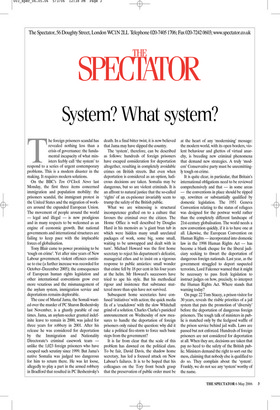System? What system?
The foreign prisoners scandal has revealed nothing less than a crisis of governance: the fundamental incapacity of what ministers feebly call ‘the system’ to respond to a series of urgent contemporary problems. This is a modern disaster in the making. It requires modern solutions.
On the BBC’s Ten O’Clock News last Monday, the first three items concerned immigration and population mobility: the prisoners scandal, the immigrant protest in the United States and the migration of workers around the expanded European Union. The movement of people around the world — legal and illegal — is now prodigious and in many respects to be welcomed as an engine of economic growth. But national governments and international structures are failing to keep pace with the implacable forces of globalisation.
Tony Blair came to power promising to be ‘tough on crime’. Yet after nine years of New Labour government, violent offences continue to rise (a further increase was recorded for October–December 2005); the consequences of European human rights legislation and other international conventions grow ever more vexatious and the mismanagement of the asylum system, immigration service and deportations remains deplorable.
The case of Mustaf Jama, the Somali wanted over the murder of PC Sharon Beshenivsky last November, is a ghastly parable of our times. Jama, an asylum-seeker granted indefinite leave to remain in 2000, was jailed for three years for robbery in 2001. After his release he was considered for deportation by the Immigration and Nationality Directorate’s criminal casework team unlike the 1,023 foreign prisoners who have escaped such scrutiny since 1999. But Jama’s native Somalia was judged too dangerous for him to return there. He was let loose, allegedly to play a part in the armed robbery in Bradford that resulted in PC Beshenivsky’s death. In a final bitter twist, it is now believed that Jama may have slipped the country.
The ‘system’, therefore, can be described as follows: hundreds of foreign prisoners have escaped consideration for deportation altogether, resulting in completely avoidable crimes on British streets. But even when deportation is considered as an option, ludicrous decisions are taken. Somalia may be dangerous, but so are violent criminals. It is an affront to natural justice that the so-called ‘rights’ of an ex-prisoner invariably seem to trump the safety of the British public.
What we are witnessing is structural incompetence grafted on to a culture that favours the criminal over the citizen. The Home Office is well described by Douglas Hurd in his memoirs as ‘a giant bran tub in which were hidden many small unrelated packages of work, some big, some small, waiting to be unwrapped and dealt with in turn’. Michael Howard was the first home secretary to reject his department’s defeatist, managerial ethos and to insist on a vigorous response to public anxieties: small wonder that crime fell by 18 per cent in his four years at the helm. Mr Howard’s successors have tried to ape his style. But his methodical rigour and insistence that substance mattered more than spin have not survived.
Subsequent home secretaries have confused ‘initiatives’ with action; the quick media fix of a ‘crackdown’ with the slow Whitehall grind of a solution. Charles Clarke’s panicked announcement on Wednesday of new measures to handle the deportation of foreign prisoners only raised the question: why did it take a political fire-storm to force such basic steps from the government?
It is far from clear that the scale of this problem has dawned on the political class. To be fair, David Davis, the shadow home secretary, has led a focused attack on New Labour’s failures. It is to be hoped that his colleagues on the Tory front bench grasp that the preservation of public order must be at the heart of any ‘modernising’ message: the modern world, with its open borders, violent behaviour and ghettos of virtual anarchy, is breeding new criminal phenomena that demand new strategies. A truly ‘modern’ Conservative party must be unremittingly tough on crime.
It is quite clear, in particular, that Britain’s international obligations need to be reviewed comprehensively and that — in some areas — the conventions in place should be ripped up, rewritten or substantially qualified by domestic legislation. The 1951 Geneva Convention relating to the status of refugees was designed for the postwar world rather than the completely different landscape of 21st-century globalisation. The world needs a new convention quickly, if it is to have one at all. Likewise, the European Convention on Human Rights — incorporated into domestic law in the 1998 Human Rights Act — has become a blank cheque for the liberal judiciary seeking to thwart the deportation of dangerous foreign nationals. Last year, as the government struggled to deport suspected terrorists, Lord Falconer warned that it might be necessary to pass fresh legislation to instruct judges on how, precisely, to interpret the Human Rights Act. Where stands that warning today?
On page 22 Tom Stacey, a prison visitor for 30 years, reveals the risible priorities of a jail system that puts the promotion of ‘diversity’ before the deportation of dangerous foreign prisoners. The tough talk of ministers in public is matched only by the feelgood waffle of the prison service behind jail walls. Laws are passed but not enforced. Hundreds of foreign prisoners are not considered for deportation at all. When they are, decisions are taken that pay no heed to the safety of the British public. Ministers demand the right to sort out the mess, claiming that nobody else is qualified to do so. They complain about the ‘system’. Frankly, we do not see any ‘system’ worthy of the name.














































 Previous page
Previous page